- Home
- Stephanie Laurens
It Happened One Season Page 2
It Happened One Season Read online
Page 2
His eyes were still adjusting to the moonlight. The large and heavy book held closed on his lap, he sank back in the armchair. Its wings would conceal him while he waited to see who entered the room. He couldn’t see the door, but if they went to the desk, he’d be able to peer around the chair’s side and see them. Unless the intruder looked specifically into the heavily shadowed corner, they were unlikely to notice him.
Tabitha Makepeace glanced quickly around the library, then whisked inside and shut the door. Pausing with her hand on the knob, she debated, but then reluctantly released it; locking the door would make her feel safer, but she might need to beat a hasty retreat.
Faint moonlight washed through the uncurtained windows, lighting her way as she crossed quickly to the desk. “With any luck, no one will come this way, but I’ll need to return as soon as I can.”
Muttering to herself was a bad habit, but as long as she was alone, why not? Especially when she had to focus on a task, the commentary was helpful.
She searched, found tinder, and lit the desk lamp. She adjusted the wick and shade so a pool of light fell on the desktop, then dumped her reticule on the desk’s corner, drew up the admiral’s chair, sat, and considered the front of Lord Rothbury’s desk. “Where, exactly, would he keep such information? In a notebook kept specifically for the task would be my guess—my hope. A journal, perhaps, but as the intention would be to conceal the information forever, a notebook’s more likely. So where? Here?” Eyes on the desk, she nodded. “Yes. I’m sure it would be here.” She glanced at the door. “If he keeps the door locked, perhaps he might feel safe enough to just leave it in a drawer.”
Leaning forward, she drew out the first drawer on the left.
Ten minutes later, after much muttering and rummaging, then putting everything back exactly as she’d found it, she sat back. Frowned. “I knew he was fastidious and pedantic—that’s why he’s certain to have written the information down and kept it all in one place, in one book. But who could have imagined he’d be so compulsively neat? There’s not even one chewed pencil or half-used stub of sealing wax, let alone an errant piece of string.” She gave a contemptuous snort. “So it’ll be here, neat, safe and secure. Most likely in a hidden drawer or compartment.”
She glanced around the library again; she’d been working in the light, so the shadows beyond the desk appeared denser. She returned her gaze to the desk. “I’d still wager it’ll be somewhere in here rather than on the shelves.”
Bending once more to her task—literally—she checked under the kneehole, then systematically checked each drawer for length, depth, and width. “There has to be some anomaly somewhere.”
Five minutes later, with a huff of frustration, she sat back and regarded the disobliging piece of furniture. She narrowed her eyes. “I know you’re hiding it, but where?”
Abruptly, she sat up. “Your desktop is remarkably thick—thick enough for a hidden compartment.” She pulled out the top left drawer, put her hand in the gap and felt upward, but even reaching to the back of the space and feeling carefully with her fingertips, she detected no line or telltale gap. There was no give in the wood forming the upper surface of the space.
“All right. Not there.” Replacing the drawer, she searched above the drawer to the right, with the same result. “The center drawer, then—” She broke off, sensing triumph. “Of course! That’s it.” Hurrying, she replaced the right upper drawer, drew out the center drawer and set it on the blotter. “Even though there’s a lock on the center drawer, he doesn’t lock it, but just keeps his pens, ink, pencils, and so on in there, so no one would suspect that that’s where he hides his secret documents.”
She felt around the upper surface of the space in which the center drawer fitted. “Yes! There it is. Now where’s the catch? Perhaps if I push on the front center of the panel …”
A distinct click rewarded her. “Oh, yes—the panel hinges down, and yes, yes, yes! There’s a notebook.”
Triumphant, she grasped it, waved it as she straightened; pushing back the drawer, she set the notebook on the blotter. Pulling the chair closer, she sat straight, drew in a huge breath, then almost gingerly opened the front cover of the notebook.
It was a slim, black-cloth-covered volume, the sort many gentlemen used to keep appointments, addresses, or wagers. “Wagers of a different sort, this time,” she murmured as, scanning the entry on the first page, she confirmed that she’d found what she’d come for.
“The payments are noted, obligingly neatly, and yes, they start just when Suzanne said the blackmailer first contacted them—in late March, just after her engagement was announced. And more payments followed.” She flicked over a page, frowned. “But they get progressively further apart. Hmm …”
She flicked back and forth, page to page. “The time between the first payment and the second was a week, but then the period between became ten days, then sixteen. And—thank you, sir—Rothbury’s noted the details for his next payment. Next week.” She whistled. “Five ponies—that’s five hundred pounds! To be paid …”
She stared at the words neatly inked on the page, then flicked back again, checked. “What are these words? Latin? I’ve heard them somewhere—lauds, terce, sext … aren’t they the hours monks observe for their prayers? Something like that. Papa will know—I can inveigle it out of him.”
Frowningly studying the notations, she mused, “So in all his entries Rothbury’s noted the amount demanded and the date in plain English, then a time in Latin, and if that’s the time he’s to make the payment, then these words on the following lines must be the place …”
Frustration gripped her. She’d come so far; she wasn’t in any mood to be denied. “There must be some trick to it.” She tried to sound out the word she assumed was a location, but it was an impossible construction of consonants. “Certainly not phonetic.” She looked back over the five previous payments noted. “Wherever there should be a place, there’s a random collection of letters.” She spelled another supposed place name aloud. “E. L. J. Z. E. L. D. M. U. F. T. P. C. L. T. R. F. What godforsaken language is that?”
“It’s a code.”
“Wha—!” She jerked upright and spun around so abruptly the chair nearly tipped over. She ended flung against the curved back, gripping the arms, staring at a man—a gentleman—as he unhurriedly rose from the depths of an armchair tucked in the shadows across the room.
The chair faced the windows; until he stood, she hadn’t been able to see him.
He straightened to his full height and started toward the desk.
Her heart was thumping. He was still beyond the circle of light thrown by the desk lamp; she couldn’t see him clearly—just his outline—yet she sensed masculine power, felt a titillating frisson of danger. His stride, long and languidly graceful, did nothing to dispel the effect. His body, long limbed, broad shouldered, solid yet lean, underscored it.
Ex-military, she guessed, and hoped that meant he’d be easily led.
Then the light found his face and she jettisoned the thought. Steel gray eyes locked on her face, his gaze level and far too acute. His lips were firm, his jaw squared, his cheeks long and hollowed beneath sharp cheekbones. Sable hair was fashionably yet conventionally cut; he was immaculately dressed, his style reserved and severe—Brummel would have approved.
Most striking of all was the aura of purpose that emanated from him.
As he neared she felt her heart speed up. Felt her lungs constrict.
Felt irrationally irritated that in order to hold his gaze she had to risk getting a crick in her neck.
“Who are you?” She assembled a frown and directed it upward. “And what the deuce are you doing here, skulking in the dark?”
Halting beside the desk, he considered her for a moment, then one dark brow arched. “Strange—I’d thought to ask you the same questions.”
His voice was deep, resonant. Hypnotic.
She inwardly shook herself. She was hardly some impressionabl
e miss to be beguiled by a handsome face, a melodic voice. She tipped her chin higher, endeavored to look superior. “I’m here on a mission. And you?” Attack would undoubtedly be her best defense.
He tugged one earlobe. His lips faintly curved. “I suppose you could say I came to the house on a mission, too, but I’ve decided to leave it in abeyance for the nonce.” He glanced at the notebook she still held open in one hand. “But you were trying to decipher a code.”
She frowned and looked down at the indecipherable writing. “How do you know it’s a code?”
“Because I’m an expert in such things.” Sebastian held out an imperious hand. “May I?”
The lady, not exactly young yet not that old either, hesitated, but then, albeit reluctantly, offered the book.
He took it, wondering why his instincts insisted he should feel pleased she’d complied—that she’d trusted him that far. Why wouldn’t she? Opening the notebook, he smoothed the page.
She watched him—he could feel her gaze on his face, beaming from bright, tawny-hazel eyes lushly fringed by red-brown lashes. She had the most amazing hair—a welter of tightly curling, flaming red locks. Even though someone had tried to restrain them in a conventional topknot, errant strands had escaped and wreathed about her forehead, cheeks, and nape.
Her skin was the rich creamy silk, not quite translucent, occasionally found in combination with such fiery hair. Now he was closer, he could detect a faint smattering of freckles across her nose.
She was fine boned, fine featured, yet the curves delectably encased by her tight bodice assured him his estimate of her age wasn’t wrong. She was mature, heading toward ripe—which, he suddenly realized, was one of the things that had been wrong about all the candidates he’d thus far examined.
From the corner of his eye, he saw her eyes narrowing. Her face was heart-shaped, her chin decidedly pointy, but her lips were luscious and wide. Ruby red and tempting.
He flipped over the notebook’s pages, noting that Rothbury had made one entry per page, on six pages.
She shifted, stretching up to look, then point. One delicate fingertip indicated the line of apparently random letters. “This is the part I can’t make out.”
“Indeed. The part in code.” He glanced at her, caught her eyes. “But what’s the rest?”
She sat back, frowned up at him. “Never mind about that—can you make out what the coded bits say?”
He considered the coded line again, then flipped back to the earlier entires. “Yes—certainly. In time.”
She sat forward. “How much time?”
It wouldn’t take long, but he wasn’t going to lose his only connection to—only hold over—this strange and distracting lady, not until she’d satisfied his curiosity.
It had been a long time since he’d felt curious about anything involving a woman.
“In order to interpret code accurately, it’s usually necessary to have the context.”
Her eyes narrowed even more. She frowned. Direfully.
Entertained—she really did have a black frown and he couldn’t recall the last time anyone had tried to frown him down—he was about to explain the meaning of “context” when her gaze left his face.
To boldly assess him. To measure him up, then down. Then she considered.
At last, lips tight, she looked up at him. “I assume the coded part is a place name, or directions to some place or spot. Some location.”
He held her gaze. “The location the blackmailer stipulated for his payments.”
Her expression momentarily blanked, then she scowled. Ferociously. At herself. “Damn it—I said all that out aloud, didn’t I?”
When she glanced up at him, he nodded.
She huffed and glared at the desk. “It’s a bad habit—don’t ever get into it.”
After a moment, he shut the notebook. Waved it. “Are you going to tell me what this is all about?”
She studied her hands, lightly gripping the desk’s edge, then glanced up and met his gaze. “Can you really read codes?”
“I said I could, didn’t I?”
“In my experience, gentlemen are rarely truthful.”
Forthright. He raised his brows. “I am.”
She didn’t back down, just considered him some more, then asked, “How did you learn to read codes?”
“I’ve a natural talent and I was in the army. The commanders learned about my knack, and so I was forever being called in to decipher and decrypt enemy orders.” And to intercept them. “I became, and still am, something of an expert.”
“Hmm.”
She fell silent. He gave her a moment, then tried another tack. “You haven’t yet told me your name.”
Coolly she replied, “You haven’t volunteered yours, either.”
“Trantor. Sebastian Trantor.” He sketched a bow. “At your service, Miss … ?”
She seemed to come to some decision. “Makepeace.” She shifted to face him and extended her hand. “Tabitha Makepeace.”
He closed his hand about her delicate fingers, briefly shook them. Reluctantly releasing her, he held up the notebook. “And this?”
Tabitha didn’t want to trust him, but she needed the information in that little black book and he seemed to be the key. Very possibly her only key. And he had fallen into her lap; looking a gift horse in the mouth was usually unwise. “I’ll tell you, but you have to promise to hold what I reveal in the strictest confidence. It was revealed to me in confidence by others, and concerns them, not me, so I couldn’t reveal their secrets if you don’t promise—if you won’t sincerely swear never to repeat what I tell you.”
Without hesitation he held up one hand at shoulder height, his large square palm toward her. “I, Sebastian Trantor, solemnly swear never to reveal a single word of what you tell me—on pain of death.”
He sounded like he meant it, even the last part. Impressed—by his impulsiveness if nothing else—but loath to show it, she nodded curtly. “That will do. Very well …” Where to start?
She drew breath and plunged in. “Since the beginning of the Season, several young ladies of my acquaintance have become engaged to be married. That in itself is nothing unusual. However, in four instances I noted that soon after the announcement appeared in the Gazette, the young ladies and their families retired to the country. That was … odd. Indeed, knowing the young ladies involved, it was distinctly strange. I suspected something was wrong.” She’d suspected something else, but … “I visited one of the young ladies in the country and she told me the truth behind her retreat from town—she and her family were being blackmailed.”
“Let me guess.” The words held a certain menace. “There’s something in the young lady’s past that, should it become public knowledge, would scupper the match?”
“Exactly. I checked with the other three, and found the same tale. And while the … for want of a better word, transgressions involved are all different, and all ridiculously minor in the wider scheme of life, if those transgressions were broadcast throughout the ton, all four matches would be in jeopardy.”
She drew breath and went on, “I spoke to two of the fathers involved—asking about the blackmailer and what was being done to bring him to justice.”
“And were promptly told to mind your own business.”
She looked up, met his eyes, saw understanding rather than condemnation in his gaze. She inclined her head. “Indeed. They were full of fear that any investigation of any sort would upset the apple cart and destroy the alliances they were otherwise so happy to have made. They—the two with whom I spoke—were convinced that the blackmailer’s demands would cease once the weddings took place.” She held his gaze. “But I can’t see that happening. What I believe will happen is that the fathers involved will cease to receive demands. I think the demands will go to their then-married daughters.”
He nodded. “Of course. If the secrets, whatever they are, are enough to endanger the wedding, then clearly they can later be used to threaten t
he marriage.”
“Which brings me here.” With one hand, she gestured at the room. “Lord Rothbury is one of the fathers involved. I haven’t spoken directly to him, but his daughter, Suzanne, is one of the blackmailer’s targets. That’s why she’s not here tonight, but in the country. Tonight’s ball was already arranged, so the Rothburys couldn’t cancel without raising questions, so they’ve put it about that Suzanne’s recovering from overexcitement at the prospect of her wedding.” Her disgust at such a slur being cast on her friend—by her own parents—rang in her tone.
Leaning against the desk, Sebastian considered the intriguing Miss Makepeace. “How is it that you know these four young ladies, all of whom are targets of a blackmailer?”
She tipped up her pointy chin. “We belong to the same association—a club of sorts.”
“A ladies’ club?” He raised his brows. “I didn’t know there were such things.”
He’d deliberately made his tone dismissive; as he’d hoped, she bristled.
“The Sisterhood was established six years ago. We have a very active membership.”
“Indeed? And what does the Sisterhood do?”
She narrowed her eyes at him. “We discuss things.”
“Such as?”
“Men.”
“Ah.” His eyes locked on hers, he managed not to grin. “Does that take much time?”
Her gaze grew flinty. “If you must know, understanding the ways of gentlemen is essential to the well-being and future happiness of young ladies expected by their families to wed. As they cannot easily avoid the altar, then best they front it with a sound understanding of how to interact with their husbands-to-be.”
“A novel notion.” One many of the young misses in Lady Rothbury’s ballroom could greatly benefit from. “So all four ladies you’ve identified as targets are members of the Sisterhood. Is there any chance that the blackmailer learned of their secrets through the club?”
He was impressed that she didn’t immediately discount the idea, but after frowning consideringly for several moments, she shook her head. “I doubt that could be—I didn’t even know they had secrets of such a nature, so I can’t see how anyone else might have learned of them.” She met his gaze. “I’m the club’s president, and besides, these secrets are not the sort of thing young ladies chatter about, not even with their closest friends. And”—she slumped back in the chair—“I asked, and they all swore they hadn’t breathed a word to any acquaintance.”

 Lady Osbaldestone’s Plum Puddings: Lady Osbaldestone’s Christmas Chronicles Volume 3
Lady Osbaldestone’s Plum Puddings: Lady Osbaldestone’s Christmas Chronicles Volume 3 The Beguilement of Lady Eustacia Cavanagh: The Cavanaughs Volume 3
The Beguilement of Lady Eustacia Cavanagh: The Cavanaughs Volume 3 Loving Rose: The Redemption of Malcolm Sinclair (Casebook of Barnaby Adair)
Loving Rose: The Redemption of Malcolm Sinclair (Casebook of Barnaby Adair) By Winter's Light
By Winter's Light Devil's Bride
Devil's Bride The Tempting of Thomas Carrick
The Tempting of Thomas Carrick![Cynster [22.00] A Match for Marcus Cynster Read online](http://i1.bookreadfree.com/i/03/16/cynster_[22_00]_a_match_for_marcus_cynster_preview.jpg) Cynster [22.00] A Match for Marcus Cynster
Cynster [22.00] A Match for Marcus Cynster All About Love c-6
All About Love c-6 Cobra 01 The Untamed Bride
Cobra 01 The Untamed Bride A Lady of Expectations and Other Stories
A Lady of Expectations and Other Stories By Winter's Light_A Cynster Novel
By Winter's Light_A Cynster Novel And Then She Fell
And Then She Fell The Greatest Challenge of Them All
The Greatest Challenge of Them All The Edge of Desire
The Edge of Desire The Trouble With Virtue: A Comfortable WifeA Lady by Day
The Trouble With Virtue: A Comfortable WifeA Lady by Day Fair Juno
Fair Juno THE LEGEND OF NIMWAY HALL: 1750 - JACQUELINE
THE LEGEND OF NIMWAY HALL: 1750 - JACQUELINE Four In Hand
Four In Hand The Reckless Bride
The Reckless Bride Stephanie Laurens Rogues' Reform Bundle
Stephanie Laurens Rogues' Reform Bundle The Untamed Bride Plus Black Cobra 02-03 and Special Excerpt
The Untamed Bride Plus Black Cobra 02-03 and Special Excerpt The Lady's Command (Adventurers Quartet #1)
The Lady's Command (Adventurers Quartet #1) The Seduction of Sebastian Trantor
The Seduction of Sebastian Trantor The Daredevil Snared (The Adventurers Quartet Book 3)
The Daredevil Snared (The Adventurers Quartet Book 3)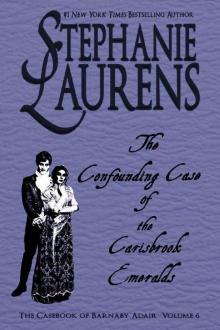 The Confounding Case Of The Carisbrook Emeralds (The Casebook of Barnaby Adair 6)
The Confounding Case Of The Carisbrook Emeralds (The Casebook of Barnaby Adair 6) Lord of the Privateers (The Adventurers Quartet)
Lord of the Privateers (The Adventurers Quartet)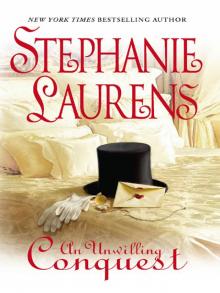 An Unwilling Conquest
An Unwilling Conquest Brazen Bride
Brazen Bride On a Wild Night
On a Wild Night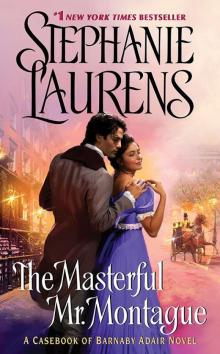 The Masterful Mr. Montague: A Casebook of Barnaby Adair Novel
The Masterful Mr. Montague: A Casebook of Barnaby Adair Novel Lord of the Privateers
Lord of the Privateers Royal Bridesmaids
Royal Bridesmaids Beyond Seduction
Beyond Seduction It Happened One Night
It Happened One Night The Ideal Bride
The Ideal Bride The Promise in a Kiss
The Promise in a Kiss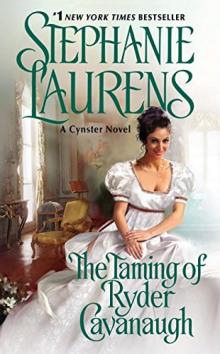 The Taming of Ryder Cavanaugh
The Taming of Ryder Cavanaugh The Ideal Bride c-12
The Ideal Bride c-12 All About Love
All About Love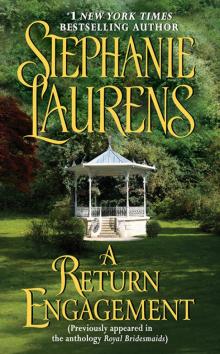 A Return Engagement
A Return Engagement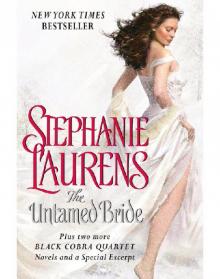 The Untamed Bride Plus Two Full Novels and Bonus Material
The Untamed Bride Plus Two Full Novels and Bonus Material Viscount Breckenridge to the Rescue
Viscount Breckenridge to the Rescue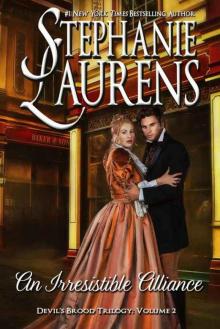 An Irresistible Alliance (Cynsters Next Generation Novels Book 5)
An Irresistible Alliance (Cynsters Next Generation Novels Book 5) The Daredevil Snared
The Daredevil Snared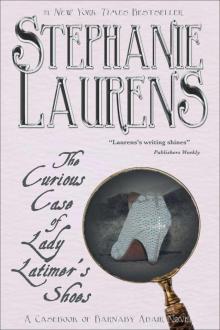 The Curious Case of Lady Latimer's Shoes: A Casebook of Barnaby Adair Novel
The Curious Case of Lady Latimer's Shoes: A Casebook of Barnaby Adair Novel A Lady of Expectations and Other Stories: A Lady of ExpectationsThe Secrets of a CourtesanHow to Woo a Spinster
A Lady of Expectations and Other Stories: A Lady of ExpectationsThe Secrets of a CourtesanHow to Woo a Spinster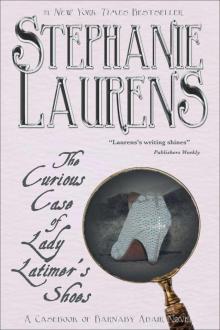 The Curious Case of Lady Latimer's Shoes: A Casebook of Barnaby Adair Novel (The Casebook of Barnaby Adair)
The Curious Case of Lady Latimer's Shoes: A Casebook of Barnaby Adair Novel (The Casebook of Barnaby Adair)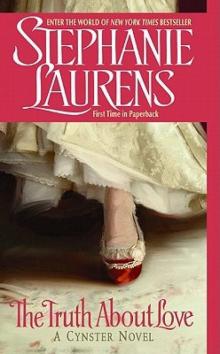 The Truth About Love
The Truth About Love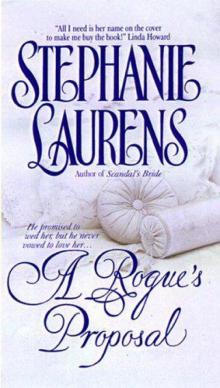 A Rogue's Proposal
A Rogue's Proposal The Elusive Bride
The Elusive Bride The Perfect Lover
The Perfect Lover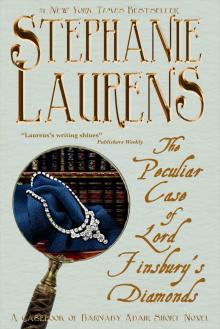 The Peculiar Case of Lord Finsbury's Diamonds: A Casebook of Barnaby Adair Short Novel
The Peculiar Case of Lord Finsbury's Diamonds: A Casebook of Barnaby Adair Short Novel The Lady Risks All
The Lady Risks All The Murder at Mandeville Hall: The Casebook of Barnaby Adair: Volume 7
The Murder at Mandeville Hall: The Casebook of Barnaby Adair: Volume 7 All About Passion
All About Passion A Match for Marcus Cynster
A Match for Marcus Cynster By Winter's Light: A Cynster Novel (Cynster Special Book 2)
By Winter's Light: A Cynster Novel (Cynster Special Book 2) The Lady By His Side
The Lady By His Side The Pursuits of Lord Kit Cavanaugh
The Pursuits of Lord Kit Cavanaugh Tangled Reins
Tangled Reins To Distraction
To Distraction A Rake's Vow
A Rake's Vow A Comfortable Wife
A Comfortable Wife A Lady of His Own bc-3
A Lady of His Own bc-3 The Capture of the Earl of Glencrae
The Capture of the Earl of Glencrae Scandals Bride c-3
Scandals Bride c-3 Untamed Bride
Untamed Bride The Brazen Bride
The Brazen Bride The Lady By His Side (Cynsters Next Generation Novels Book 4)
The Lady By His Side (Cynsters Next Generation Novels Book 4) Tangled Reins and Other Stories
Tangled Reins and Other Stories Impetuous Innocent
Impetuous Innocent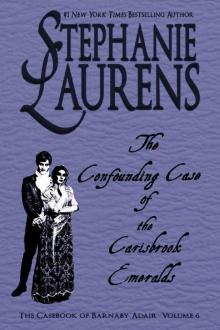 The Confounding Case Of The Carisbrook Emeralds
The Confounding Case Of The Carisbrook Emeralds Stephanie Laurens - B 6 Beyond Seduction
Stephanie Laurens - B 6 Beyond Seduction What Price Love?
What Price Love? A Fine Passion
A Fine Passion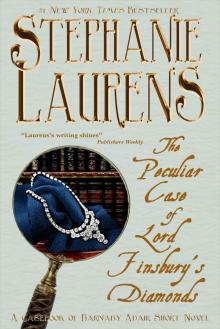 The Peculiar Case of Lord Finsbury's Diamonds: A Casebook of Barnaby Adair Short Novel (The Casebook of Barnaby Adair)
The Peculiar Case of Lord Finsbury's Diamonds: A Casebook of Barnaby Adair Short Novel (The Casebook of Barnaby Adair) Where the Heart Leads
Where the Heart Leads The Designs of Lord Randolph Cavanaugh
The Designs of Lord Randolph Cavanaugh A Secret Love c-5
A Secret Love c-5 On a Wicked Dawn c-10
On a Wicked Dawn c-10 A Gentleman's Honor
A Gentleman's Honor THE LEGEND OF NIMWAY HALL_1750_JACQUELINE
THE LEGEND OF NIMWAY HALL_1750_JACQUELINE A Lady of Expectations
A Lady of Expectations Royal Weddings: An Original Anthology
Royal Weddings: An Original Anthology The Ideal Bride (Cynster Novels)
The Ideal Bride (Cynster Novels) Mastered by Love
Mastered by Love A Buccaneer at Heart
A Buccaneer at Heart Captain Jack’s Woman / A Gentleman's Honor
Captain Jack’s Woman / A Gentleman's Honor Devil's Bride with Bonus Material
Devil's Bride with Bonus Material A Lady of His Own
A Lady of His Own A Secret Love
A Secret Love Melting Ice
Melting Ice Scandal's Bride
Scandal's Bride Lady Osbaldestone’s Christmas Goose
Lady Osbaldestone’s Christmas Goose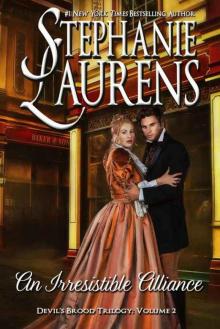 An Irresistible Alliance
An Irresistible Alliance It Happened One Season
It Happened One Season In Pursuit Of Eliza Cynster
In Pursuit Of Eliza Cynster Captain Jack's Woman
Captain Jack's Woman The promise in a kiss c-8
The promise in a kiss c-8 The Masterful Mr. Montague
The Masterful Mr. Montague The Lady Chosen
The Lady Chosen A Gentleman's Honor bc-2
A Gentleman's Honor bc-2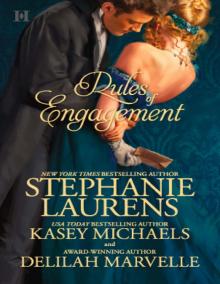 Rules of Engagement: The Reasons for MarriageThe Wedding PartyUnlaced (Lester Family)
Rules of Engagement: The Reasons for MarriageThe Wedding PartyUnlaced (Lester Family) Secrets of a Perfect Night
Secrets of a Perfect Night The Taste of Innocence
The Taste of Innocence On A Wicked Dawn
On A Wicked Dawn The Untamed Bride
The Untamed Bride A Rogues Proposal c-4
A Rogues Proposal c-4 Rakes Vow c-2
Rakes Vow c-2 Devils Bride c-1
Devils Bride c-1 Hero, Come Back
Hero, Come Back On a Wild Night c-8
On a Wild Night c-8 All About Passion c-7
All About Passion c-7